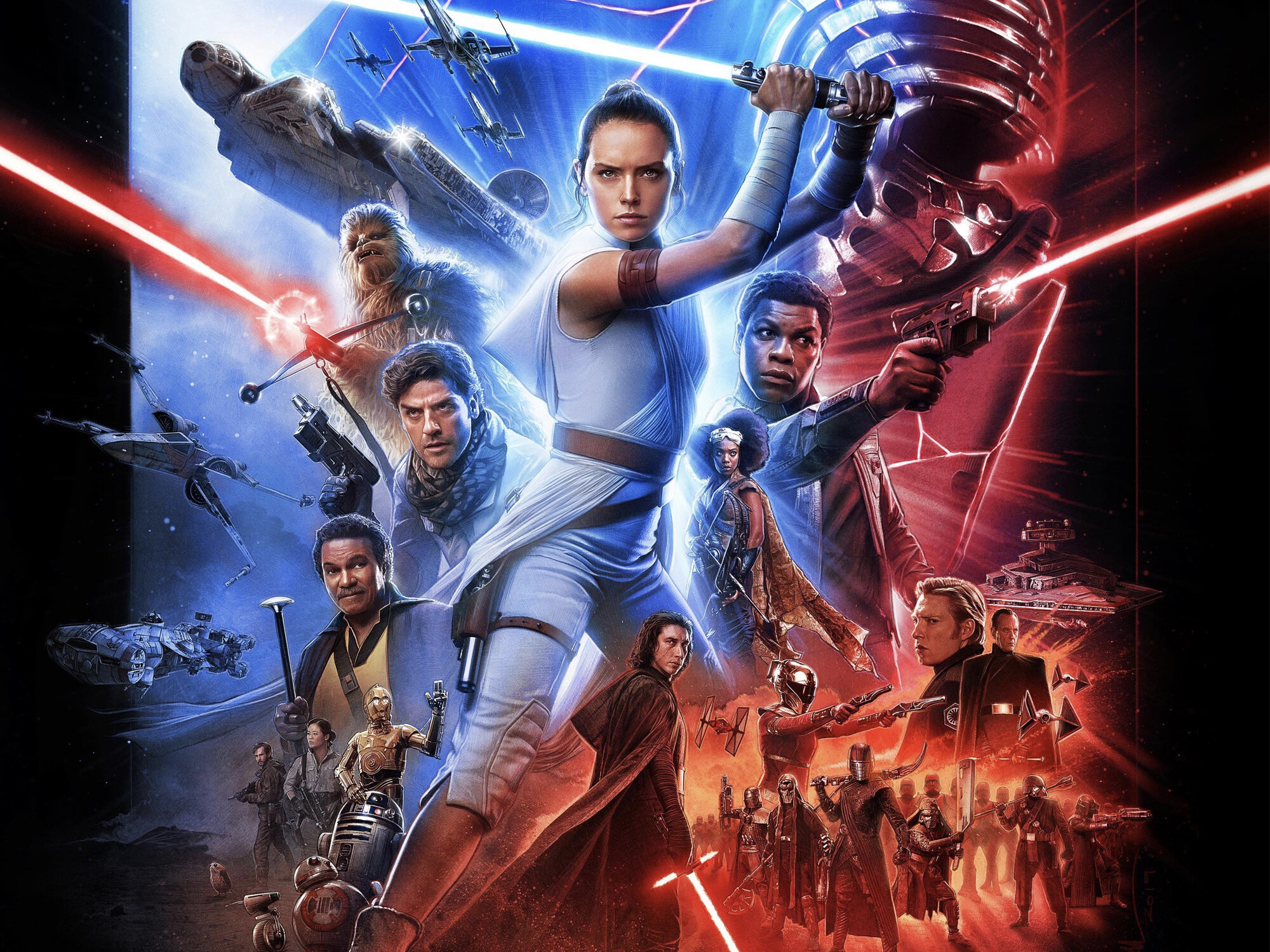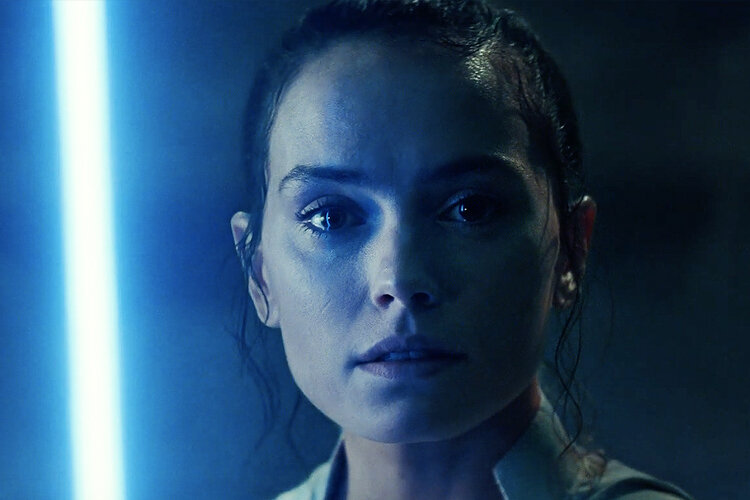Film Review: Star Wars: The Rise of Skywalker
Rote and Cowardly, The Rise of Skywalker Sets a Dangerous Precedent
Lazy and uninspired, J.J. Abrams’ Star Wars: The Rise of Skywalker is a pandering regression from the bold new direction established by Rian Johnson’s The Last Jedi. Even worse, it’s the first Star Wars film engineered to please its loudest and most troubled demographic: the toxic fandom. A frantic rush to bring a nine-film saga to a close, The Rise of Skywalker is filled with narrative dead-ends, aborted character arcs, and generic fetch quests, all designed to please as many people as possible. Minor spoilers below…
“Let the past die. Kill it if you have to. It is the only way to become what you were meant to be.” In 2017, Rian Johnson’s divisive The Last Jedi - with all of its charms and faults - set its eyes on recontextualizing the Star Wars mythos. Daring to scry a future free from tradition and legacy, Jedi and Sith, Skywalkers and Palpatines, the middle entry of the new sequel trilogy boldly jettisoned the status quo. But where The Last Jedi shed the trappings of old, detonating mythologies in service of an exciting and uncertain future, The Rise of Skywalker reaches back with a nostalgic vice-grip, unable to let go of the past in the most frustrating of ways. A weightless and rushed end-cap all too eager to check boxes rather than provide any semblance of real catharsis or closure, the final installment of a saga over forty years in the making lands with a whimper and a shrug.
Of The Last Jedi’s many - and oftentimes controversial - contributions to the Star Wars narrative, none are more resonant than the parallel arcs of Kylo Ren (Adam Driver) and Rey (Daisy Ridley). Introduced in 2015’s The Force Awakens, Kylo Ren was established as a conflicted dark-sider drawn to the light, while Rey was a mysterious new heroine grappling with her place in the galaxy. With The Last Jedi, writer and director Rian Johnson deepened their stories by exploring the concept of legacy, setting up Kylo Ren and Rey as opposite sides of the same coin. It’s one of Star Wars’ most compelling threads: a corrupted Ben Solo, torn asunder and crushed under the weight of the Skywalker, Vader, and Solo mantles, comes into conflict with Rey, a Force-user untethered from the franchise’s deeply entrenched bloodlines - “a nobody.” In a fateful encounter, Kylo spits venomous truth about Rey’s parents to her face: “They were filthy junk traders. Sold you off for drinking money. They're dead in a pauper's grave in the Jakku desert. You come from nothing. You're nothing. But not to me.” Even the material surrounding The Last Jedi’s release, barely a year old, supported Johnson’s bold democratization of the Force; the book Women of the Galaxy summarizes Rey: “Just because you come from nothing doesn’t mean you’re not part of the story. You’re not no one, because anybody can save the galaxy. Anyone.”
“…
The Rise of Skywalker reaches back with a nostalgic vice-grip, unable to let go of the past in the most frustrating of ways.”
Even leading up to the release of The Rise of Skywalker, the water seemed troubled. In the onslaught of press that coincided with the film’s premiere, many of the actors and creators started taking what could only be construed as thinly-veiled potshots at the The Last Jedi. J.J. Abrams, in a widely quoted statement, took his swing: “It’s a bit of a meta approach to the story. I don’t think that people go to Star Wars to be told, ‘This doesn’t matter.’” Furthermore, John Boyega took umbrage at the fact that the cast was separated for much of the last film, while Daisy Ridley “cried” with relief when it was announced that Abrams would be returning to close out the saga. All of this, coupled with the fact that there is a small but incredibly vocal contingent of the fanbase that hates everything about The Last Jedi - from its perceived sidelining of Luke Skywalker (Mark Hamill), to its inclusion of a woman of color, Rose Tico (Kelly Marie Tran) - the onus was on Abrams to close out the sequel trilogy in the most satisfactory way.
Unfortunately, in this case, satisfactory also equates to prohibitively safe. The Rise of Skywalker sacks all of The Last Jedi’s narrative boldness and characterization in favor of crowd-pleasing fan service - walking back the most compelling aspects of Rian Johnson’s entry, the film is suffocatingly beholden to nostalgia and Star Wars history. And while it’s one thing to tell a vapid story that fruitlessly clings to tradition, it’s another issue entirely to send the following - much more troubling - message to its toxic fandom: “Your voice matters and we’re listening.” If you desperately wanted Rey’s parents to be related to a legacy character, if you wanted Rose to be marginalized into oblivion, if you wanted a clear explanation for Supreme Leader Snoke, or if you wanted a non-stop stream of MacGuffins and fetch quests loaded with sly references, then The Rise of Skywalker is the perfect remedy for your The Last Jedi woes.
The first words of the film’s opening crawl sets the tone for the franchise’s most ossified entry: “The dead speak!” Following The Last Jedi in terms of chronology, but not in spirit, Rise establishes that Emperor Palpatine (Ian McDiarmid) has returned from the dead, pulling the strings of the First Order from the shadows. There’s not much more to the paper-thin plot, as General Leia Organa’s (the late Carrie Fisher) ragtag resistance once again strives to defeat a sinister super-weapon. If there’s one word to distill the film to its purest essence, it would be “frenzied.” The Rise of Skywalker wears its deficit of attention on its sleeve, often opening doors without bothering to close them: There are subplots about Poe Dameron’s (Oscar Isaac) shrouded past, Finn’s (John Boyega) big secret, and even a rebel Stormtrooper movement, but the film clearly doesn’t have the narrative economy to effectively explore any of them. And for such a manic film, much of the plot feels strangely inert - most of its busy-ness is tied up in fetch quests and poorly explained MacGuffins. Abrams and screenwriter Chris Terrio (Argo, Justice League) love to wheel-spin; whether it’s rebooting C3PO’s (Anthony Daniels) memory or chasing a nonsensical Sith Wayfinder, The Rise of Skywalker chugs along with enervated purpose.
“
The Rise of Skywalker wears its deficit of attention on its sleeve, often opening doors without bothering to close them…”
With its breathlessness, Rise also saps the energy from the two characters arcs that needed the most care and thought to close out: those of Kylo Ren and Rey. Adam Driver and Daisy Ridley’s performances remain the best part of the sequel trilogy, even in this film, but their characters’ resolutions are hamstrung by the narrative’s inability to focus on them. Ben Solo’s redemption arc, especially, is undercooked; Lindsey Romain of The Nerdist may have said it best in her analysis about the character: “He calls himself Kylo Ren, but he’s really the child of Han Solo and Leia Organa. A Prince of Alderaan, the son of war heroes, the nephew of Jedi master Luke Skywalker. But who is he? And what does he want? The films tease his interiority - as well as his past - but in the end, his journey is frustratingly vague, to the detriment of the saga, his family, and himself.” Even more egregiously, Romain points out, his most compassionate moments - ones crucial to understanding his arc as a whole - are excised completely, relegated to comic books and other supplemental merchandise.
There are, however, still moments left over to enjoy in the film. The entire cast gives it their all when it comes to the frantic adventure, and it’s especially fun to see Ian McDiarmid chew up the scenery as Emperor Palpatine once again, even if his resurrection is largely misguided. And Adam Driver finally gets a chance to flex some playfulness and levity along with his signature Kylo Ren dourness, even providing the few emotional moments of Rise that do land. In addition, the film is also quite pretty to look at; Dan Mindel returns after The Force Awakens as director of photography, giving its empty spectacle at least a veneer of lush beauty.
Rian Johnson, in a Radio.com interview, railed against the propensity to bend over backwards and please fans. “I think approaching any creative process with [making fandoms happy] would be a mistake that would lead to probably the exact opposite result,” Johnson said. “I want to be shocked, I want to be surprised, I want to be thrown off-guard, I want to have things recontextualized, I want to be challenged as a fan when I sit down in the theater.” It’s a sentiment I largely agree with. Unfortunately, Star Wars: The Rise of Skywalker is the exact opposite of the daring challenges offered by The Last Jedi. An empty vessel crafted specifically to be filled by the lowest-common-denominator, it’s indicative of the lack of forethought put into the new sequel trilogy in the first place. It’s supremely disappointing to see that of the endless possibilities available to be painted on the Star Wars canvas, The Rise of Skywalker chose to erase its predecessor and retreat into its own safety.













